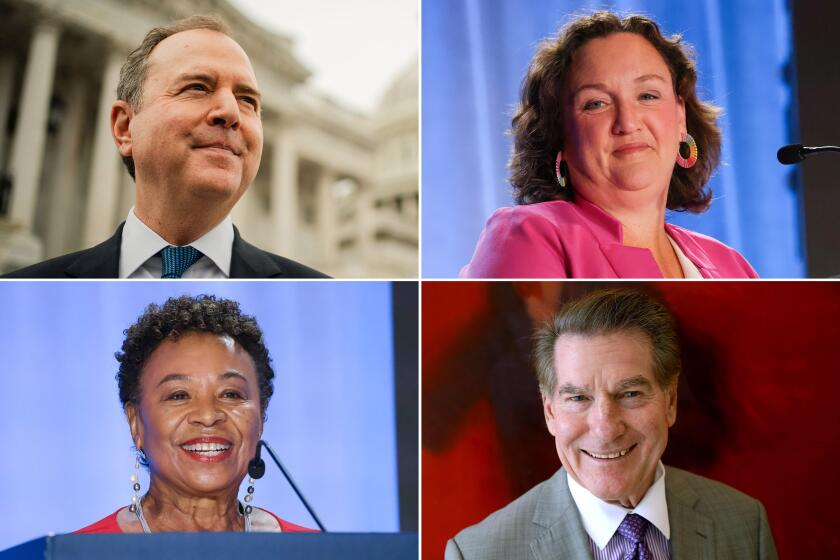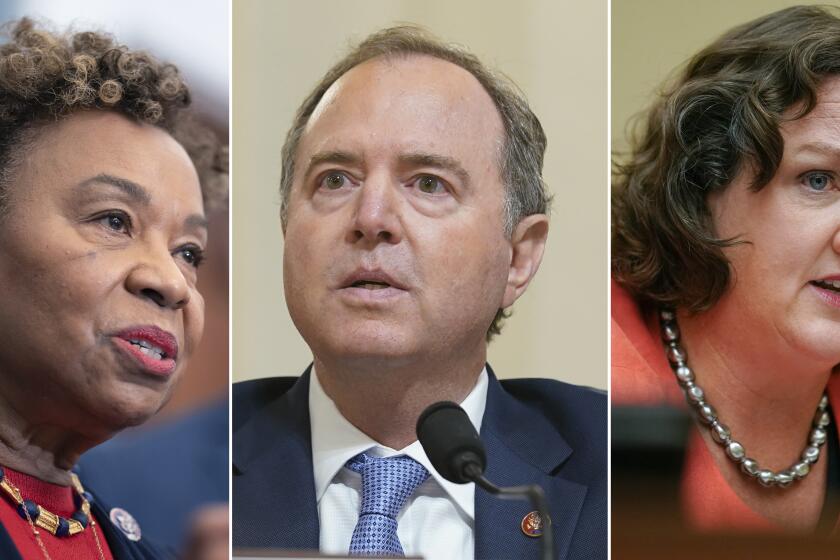Silicon Valley tech executive announces U.S. Senate campaign

- Share via
Arguing that California needs a new type of representation in the nation’s capital, Silicon Valley executive Lexi Reese announced Thursday that she is running for the U.S. Senate seat being vacated by retiring Sen. Dianne Feinstein.
“More of the same is not going to get us different outcomes and we need better outcomes,” said Reese, 48. “The same type of seasoned politicians taking the same approach, which feels to me and a lot of the people that I speak with like really bad reality TV fights that do nothing to help Californian or American families. That is not going to get us different results.”
Democrat Lexi Reese said she is considering a run for U.S. Senate because California needs ‘leaders with a different perspective.’
Reese, a Democrat who previously worked at Google, Facebook, American Express and other companies, has never run for office. She joins a crowded field vying for Feinstein’s seat next year.
Reps. Adam Schiff of Burbank, Katie Porter of Irvine and Barbara Lee of Oakland are the top Democrats seeking the seat, while attorney Eric Early and veteran James Bradley are the most well-known Republicans. Former Los Angeles Dodgers baseball star Steve Garvey, also a Republican, is also considering a run.
Sen. Dianne Feinstein had announced that she would not seek reelection before her death. Here are the announced and potential candidates for her seat.
Reese, while prominent in business circles, is not as well known as any of the other Democrats running for the seat. Reese declined to disclose her net worth, saying she did not want to give an inaccurate number, and would file the required financial disclosures. She said she could not self-fund her campaign but plans to invest a “significant” amount in her run.
“I don’t have a definitive number because I think it depends on how this is going,” Reese said. “I think it’s really important to say this campaign is only going to be made possible by the support of tens of thousands and millions of Californians.”
While Schiff and Porter each raised millions of dollars in the race for Dianne Feinstein’s Senate seat, Schiff has tens of millions more cash in the bank.
Her campaign team includes veteran strategists, such as President Biden’s 2020 pollster Celinda Lake and Sen. Elizabeth Warren’s national political director during her presidential run, Rebecca Pearcey.
California has a long history of wealthy individuals unsuccessfully running for office and either self-funding their campaigns or contributing a significant amount of money, such as Republicans Meg Whitman and Carly Fiorina and Democrat Al Checchi.
Reese argues she will be successful because of her background working to create opportunities for small businesses and nonprofits over nearly three decades working in technology and business, as well as her background growing up in an economically struggling family.
Her father worked at Sears for more than two decades before losing his job in the 1980s because of automation, Reese said. Her parents divorced, and her siblings struggled with addiction. Her sister recovered, but her brother died because of it in 2017.
“So I know very intimately,” Reese said. “It’s very personal for me that when you lose a paycheck, you lose way more than the dollars. It can be a loss of dignity. It can be a loss of security that holds your family together.”
These experiences provide her with a unique perspective and skill set to “unlock the economy and create pathways to more inclusive, shared prosperity,” she said.
She said she spent the past year talking to people around the state and decided to run because of the dire problems facing residents.
“California is amazing in so many ways, but our economy is a hot mess,” Reese said. “California is increasingly unlivable. It’s expensive. Homelessness is out-of-control. Housing is out-of-reach. Crime and gun violence are up. Education outcomes for low income kids are down. And we’re facing massive changes in the climate that are bringing fire and floods to all of our doorsteps.”
Many of these issues are handled by state and local governments, and some of Reese’s proposals, such as adding “digital citizenry” into public school curriculum, are not in the purview of the federal government.
She said the federal government can impact these issues, however, such as creating a federal minimum wage for teachers, paying for the education and lifelong benefits for teachers and healthcare workers, providing companies that invest in their workers a “human capital tax credit,” and reducing federal taxes and regulations on small- and medium-sized businesses. She said she would propose legislation paying federal elected officials the federal hourly minimum wage of $7.25.
Abortion access, gun control and protection for the LGBTQ+ community are also among her top priorities.
“Let’s really think about federal legislation through the eyes of the families that are going to be living with the consequences,” Reese said. “In my world, you discuss and you debate, and then you disagree and commit. And I feel like we have lately seen a lot of food fights in the Senate, but we haven’t seen the commitment in a way that’s showing up in families’ real everyday lives. And that’s what I want to change.”
More to Read
Get the L.A. Times Politics newsletter
Deeply reported insights into legislation, politics and policy from Sacramento, Washington and beyond. In your inbox three times per week.
You may occasionally receive promotional content from the Los Angeles Times.














